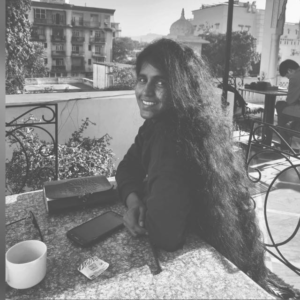Something like a manifesto
Why is it that animals were a part of our childhood? Friends and foes once, they are now no longer of any importance to us. Now, barely a handful of animals populate India’s cultural imaginary: street dogs, cows, elephants, tigers. As the moral and spiritual landscape of the nation changes, so do the animals that we can see and think about. We eat them, wear them, harness them, worship them, live with them, and yet, deny kinship with them. When and how were the boundaries drawn, the animal denied and invisibilized? How did the strict differentiation between the human and nonhuman animal come about in a country where folklore, cultural practices and religion are steeped in hybrid humanimals?
This collective draws on the animal life in and around us as inspiration to think critically about animal studies in our local, Indian contexts. Is there an Indian animal? Is there an Indian way of organically relating to the animal, perhaps communicating with it? Our ‘culture’ teaches us about seva or service because of which many people feed stray animals, maitri or loving-kindness and daya or mercy to be practiced towards all living beings, but India has moved past all that, rushing headlong into postcoloniality, unto globalized modernity. Yet, significant normative differences exist between cultures: what is seen as positive, desirable or permissible in one culture may be negative, undesirable or impermissible in another. By responding to, and reading with, other scholars in critical animal studies and other allied fields, this collective aims to develop a sense of self, if you will, to think about the Indian animal in the anthropocene.
As the word ‘collective’ suggests, we are an ill-defined group approaching the question of the animal from diverse disciplines. What binds us is the conviction that the Indian animal merits a nuanced gaze and a tailor-made methodological and theoretical approach. At home or anywhere, anyone who thinks or dreams about the animal is welcome. Imagine you are in a garden and your amma has washed all these bed sheets but now, you have to move the sheets with your dirty hands, get wet and possibly, earn the well-deserved screams of your mother. In parting, lifting and getting dirty, we move, and it is our hope that all these deflections which could also be said to embody the Indian way of life today will be useful to help us know the animal.
Above all, this project is run by the animals in our lives. The big cats and elephants that we profess to admire, the dogs, cats and birds that we know and love, the mosquitoes, spiders and centipedes we shun, and all the others that we do not even notice.
If you want to discuss a possible collaboration or get in touch with us, you can reach us at susanharisr@gmail.com or pande22anu@gmail.com
The Critters

Anu Pande is an Assistant Professor in the Department of Germanic Studies at the English and Foreign Languages University (EFLU), Hyderabad. She explores processes of othering across political ideologies, gender identities, and species boundaries.

Susan Haris is an Assistant Professor in the Department of Humanities and Social Sciences at BITS Pilani. Her research spans human–wildlife conflict, the socio-moral histories of human–animal relationships, and animal ethology.
Creative Design: Ajay Chandra Vasagam
Website Development: Khushank Raj Mahawan